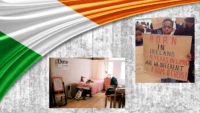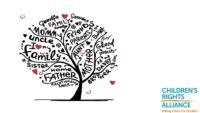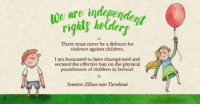Children’s Rights Alliance lecture marking the work of Jillian van Turnhout
Senator in Seanad Éireann from 2011 to 2016
in The Ark, A Cultural Centre for Children
13 April 2016
Speech by Jillian van Turnhout
Thank  you Children’s Rights Alliance for this wonderful opportunity to reflect on my path to children’s rights advocacy and my term of office in Seanad Éireann.
you Children’s Rights Alliance for this wonderful opportunity to reflect on my path to children’s rights advocacy and my term of office in Seanad Éireann.
So, what can you expect from this evening? I plan to start by sharing a bit about myself and my journey. I will use some of the legislation we dealt with in the Seanad to offer insights into both success and failure and how best to avoid the latter. I hope you will find it interesting and to the NGOs in the room, I hope it will help you both understand life inside the bubble and how best to shape it.
As I look around the room I see so many friends and supporters. I know I couldn’t do what I do without you. On this note I want to begin by giving a very special thank you to my husband Michael who is my rock. A huge thanks to my Mum, Jenny Hassett and my late Dad Michael Hassett for always believing in me and nurturing the eternal optimist in me who believes she can make the world a better place. To my brothers John and Gerry for the reality checks and keeping me grounded. And to my sisters-in-laws Philo and Gina for always cheering me on. My Researcher and Assistant in the Seanad over the last 5 years, Amy McArdle, is also here tonight and I want to pay her a special thanks for all her support and expertise as our time working together comes to an end. Amy, I wish you good fortune as you move to your exciting new challenge.
My Dad lost his Mum at the age of 8 and lost his Dad less than 3 months later following a bicycle accident. Unbeknownst to him, my Mum, living only a short distance away, would soon be grieving the loss of her Dad. So much tragedy in their early years and both tell of how narrowly they escaped a fate in one of the children’s institutions we are only too aware of today. They were lucky you see. They both had strong, determined adults who believed in them. So, while they grew up in hardship, they grew up knowing they were loved. This is the gift they gave to me and my brothers, the gift of growing up wrapped in love. When asked what one thing I would want for every child? My answer is always “to have an adult who believes in them fully and strives with them to realise their dreams”. It has taken me until now to realise that their experience, and the experience they gave to us their children, was a key factor drawing me to children’s rights.
 For the first 12 years of my career I worked in the private sector but throughout this time I was working with children and young people in a voluntary capacity not least through my involvement with the Irish Girl Guides. Anyone who knows me knows I’m a Girl Guide! I have endeavoured in every role and position I have held to date to live by my Guide Promise and Law to ensure that “I think of others before myself”.
For the first 12 years of my career I worked in the private sector but throughout this time I was working with children and young people in a voluntary capacity not least through my involvement with the Irish Girl Guides. Anyone who knows me knows I’m a Girl Guide! I have endeavoured in every role and position I have held to date to live by my Guide Promise and Law to ensure that “I think of others before myself”.
Just over 20 years ago I was elected as Secretary General to one of the then three European youth platforms – it brought together all the International Youth Organisations at a Council of Europe level. Over three years I worked in Brussels with the leadership of the other two youth platforms to successfully merge into the European Youth Forum – a sole platform for youth organisations across Europe.
On returning to Ireland I was honoured to be elected as President of the National Youth Council of Ireland. Now, I know I’m showing my age here but I remember getting my first mobile phone in this role and the excitement of waiting for it to ring. I also remember doing my first radio interview and my Mum, who remains my dedicated media consultant to this day, giving me her first piece of advice “I hope you are not going to be one of those moaners who is always complaining. If you want to be a game changer then you need to focus on how to solve the problems”.
I went on to be a member of the European Economic and Social Committee which is an advisory body of the EU and was honoured to be elected to the position of Vice President. As part of my work on the EESC I was a member of the EU-China Round Table, which took me back and forth to China over several years. In this role I was the rapporteur on its Children’s Rights Report.
I still remember my job interview in the Central Hotel for the Children’s Rights Alliance in May 2005. I remember thinking it was a long shot since my professional experience until then was primarily in the private sector, albeit with the advantage of significant performance driven results expertise, but still it was only my voluntary work that was directly relevant to the work of the Alliance. Perhaps I needed to think more like a man and focus on all the things I could offer.
In accepting the role I met every metaphor going-baptisms of fire, roads hit running, and deep ends plunged. Within my first year in the Alliance we produced a Shadow Report and had appeared before the UN Committee on the Rights of the Child, we also produced a children’s report to the Committee and had agreed a Social Partnership deal entitled, somewhat optimistically, “Towards 2016”.
In my time in the Alliance I worked with many wonderful and talented people and I would like to take this opportunity to wish one of them, Maria Corbett, every success with her exciting new venture. Maria recently announced she is going to take up a full time PhD with NUIG to examine the process of how we decide to take children into care. I can’t think of a better person for the job. During this time, I also developed a great relationship with Prof Geoffrey Shannon whose legal expertise I have always appreciated. Thank you both for your firm and lasting friendship.
It was on taxi ride through Shanghai’s equivalent of Temple Bar in 2011 that I received the fateful phone call from the Taoiseach, Enda Kenny, inviting me to accept his nomination to the Seanad. I hope you will appreciate just how surreal a moment that was for me! To this day I remember clearly him stressing that he wanted me to be truly independent and keep my own voice.
So this evening, in the spirit of ‘keeping my own voice’ I intend to peel away some of the layers of legislative mystery. While the Seanad transcripts will give you the “record” of how various Bills pass through the House, I will give you a behind the scenes look at what really influenced and shaped some of the legislation I worked on.
Finance (Local Property Tax) Act 2012
In preparing for the Local Property Tax Bill in 2012 I knew that many children and youth  organisations owned residential venues and was concerned they would face paying significant Property Tax bills. I rang the Department of Finance to explain my concerns. As it happened, the Official I spoke to had had a daughter in the Girl Guides and got exactly what I was talking about. In December 2012 I tabled an amendment to the Bill to exempt venues owned by children and youth organisations from the Property Tax. The Minister for Finance, Michael Noonan TD, did not accept my amendment but did commit to come back with an amendment to achieve the same aim in a few months. I took him at his word and in March 2013 he came back and granted the exemption and specifically cited Guiding and Scouting as an examples of why he was doing so.
organisations owned residential venues and was concerned they would face paying significant Property Tax bills. I rang the Department of Finance to explain my concerns. As it happened, the Official I spoke to had had a daughter in the Girl Guides and got exactly what I was talking about. In December 2012 I tabled an amendment to the Bill to exempt venues owned by children and youth organisations from the Property Tax. The Minister for Finance, Michael Noonan TD, did not accept my amendment but did commit to come back with an amendment to achieve the same aim in a few months. I took him at his word and in March 2013 he came back and granted the exemption and specifically cited Guiding and Scouting as an examples of why he was doing so.
As we all know, there is often a disconnect between law making and the practical reality on the ground. There is no better feeling in the world than knowing you have bridged that disconnect and won a victory for civil society.
Protection of Children’s Health (Tobacco Smoke in Mechanically propelled Vehicles) Bill 2012
On New Year’s Day 201 6, the Protection of Children’s Health (Tobacco Smoke in Mechanically Propelled Vehicles) Act of 2014 came into effect in Ireland. This legislation extends the workplace ban on smoking to all vehicles where children are present. The impetus for this important legislative change was in fact the Protection of Children’s Health from Tobacco Smoke Bill 2012, which I initiated with Senators John Crown and Mark Daly with the support of John’s assistant Shane Conneely. We started the process optimistically in spring 2012 with a view to its passage before the summer recess. Instead what ensued was months of tedious meetings and games of tag with John Crown stressing the urgency of the Bill, Mark working the political aspects and me bringing the children’s rights expertise but also the diplomacy necessary to calm the waters and steady the ship. Each of us played to our strengths. In the end, some three years later, even though only a handful of words from our original Bill remained due to amendments but we got it over the line.
6, the Protection of Children’s Health (Tobacco Smoke in Mechanically Propelled Vehicles) Act of 2014 came into effect in Ireland. This legislation extends the workplace ban on smoking to all vehicles where children are present. The impetus for this important legislative change was in fact the Protection of Children’s Health from Tobacco Smoke Bill 2012, which I initiated with Senators John Crown and Mark Daly with the support of John’s assistant Shane Conneely. We started the process optimistically in spring 2012 with a view to its passage before the summer recess. Instead what ensued was months of tedious meetings and games of tag with John Crown stressing the urgency of the Bill, Mark working the political aspects and me bringing the children’s rights expertise but also the diplomacy necessary to calm the waters and steady the ship. Each of us played to our strengths. In the end, some three years later, even though only a handful of words from our original Bill remained due to amendments but we got it over the line.
Adoption (Identity and Information) Bill 2014
Tens of thousands of Irish adoptees don’t know their original names, who their parents  are or their medical history. In November 2014 I co-sponsored legislation with Senators Averil Power and Fidelma Healy Eames to recognise the right to identity of adopted children.
are or their medical history. In November 2014 I co-sponsored legislation with Senators Averil Power and Fidelma Healy Eames to recognise the right to identity of adopted children.
As an adopted child, an adoptive parent and a children’s rights advocate, we each brought our own unique perspectives to the table. Thanks to cross party support in the Seanad we persuaded Government to allow the Bill pass through Second Stage (no mean feat!!).
For those who are not au fait with the legislative process, there are 5 Stages in the passage of a Bill but it is the middle 3 that are the most substantive. In short:
- First Stage initiates the Bill and gets it on the agenda of the first House (Dáil or Seanad);
- Second Stage is the general debate on the purpose, intention and scope of the Bill;
- Third Stage (aka Committee) goes through the Bill section by section and considers individual amendments;
- Fourth Stage (aka Report) allows you to review issues raised at Committee and table additional amendments; and
- Fifth Stage (Final) sees a vote on entire Bill.
A successful Bill then goes to the other House, and follows stages two to five and then hopefully it is enacted into Law. Many Bills, particularly those not initiated by Government, fall or stall at one hurdle or another…and some reappear as a Government Bill down the line!!
Back to our Adoption Bill and we are now at Committee Stage the third stage of the Seanad process. Unusually, since we were the authors of the Bill, we had tabled a considerable number of amendments to address issues raised by the Minister for Children and Youth Affairs, James Reilly, at Second Stage. Averil and I worked as a tag team and it was the one and only time I occupied the Fianna Fáil front bench seats in the Seanad. It became clear as we were working through the amendments that the Minister and his officials had decided to neither engage nor oppose our amendments.
While this was allowing us to whiz through the changes we proposed it was all very bizarre. It was at this point I got a text message from an Official in the House kindly pointing out that the schedule did not limit us from pushing the Bill through all stages. So, following a speedy consultation with Averil, we agreed to give it a go but not before giving the Minister his opportunity. I took to my feet and asked the Minister if he would be willing to engage with us on our Bill before Report Stages, which we were willing to take another day otherwise we would progress all Stages.
At the end of Committee Stage we asked again and there was still no comment. So we pressed ahead to Report Stage and then with thanks to the Government Senators jumped the final hurdle and took the fifth and final stage. These last two stages took all of 30 seconds maximum.
We now had a powerful tool in our armoury on the Right to Identity for all adoptees. We had a Bill that had passed unopposed through all stages in the Seanad. Surely the Dáil could pick it up and amend it if and where necessary.
Our efforts pushed the Minister and the Department to publish its own Heads of Bill on Adoption (Information and Tracing). The Heads had come a long way from formerly stated positions. There are still obstacles, which were highlighted during the excellent hearings by the Health and Children Committee and detailed in its subsequent report. There are over 50,000 adult children whose right to their identity could soon be realised. This issue is a ticking clock as many are aging and many not see the legislation published let alone enacted. It is urgent.
Immigration (Reform) (Regularisation of Residency Status) Bill 2014
Passing legislation is never easy and unfortunately things don’t always go to p lan! Case in point, a Bill proposed by Senator David Norris and myself to provide a pathway to residency for asylum seekers who have been awaiting a decision on their protection application for 4 years or more. We had worked on the substance and intention of the Bill with a number of individuals and organisations working with refugees and migrants. We knew the Bill we initiated wasn’t technically perfect but we hoped for the support of the House to move the Bill to Committee Stage where the necessary changes could be made. However, Senator Norris and I were blindsided by Sinn Fein. They had been approached by another NGO working in the area who did not agree with the use of the term ‘amnesty’ and so lobbied to block its passage. Sinn Fein voted with Government against the Bill and we lost the passing of Second Stage by 1 vote. We never expected our Bill to pass into law rather we saw it as an important opportunity to highlight the appalling reality of Direct Provision and to put pressure on the Department of Justice and Equality to act.
lan! Case in point, a Bill proposed by Senator David Norris and myself to provide a pathway to residency for asylum seekers who have been awaiting a decision on their protection application for 4 years or more. We had worked on the substance and intention of the Bill with a number of individuals and organisations working with refugees and migrants. We knew the Bill we initiated wasn’t technically perfect but we hoped for the support of the House to move the Bill to Committee Stage where the necessary changes could be made. However, Senator Norris and I were blindsided by Sinn Fein. They had been approached by another NGO working in the area who did not agree with the use of the term ‘amnesty’ and so lobbied to block its passage. Sinn Fein voted with Government against the Bill and we lost the passing of Second Stage by 1 vote. We never expected our Bill to pass into law rather we saw it as an important opportunity to highlight the appalling reality of Direct Provision and to put pressure on the Department of Justice and Equality to act.
I appreciate the motivation of the NGO concerned but I still think it was a short sighted step that showed scarce respect for their fellow NGOs and more importantly removed an important lever to effect change.
Children and Family Relationships Bill 2015
The Children and Family Relationships Bill really illustrates the importance of  collaboration and I wish to commend the Children’s Rights Alliance not only for their work on this Bill but for their unstinting support and expertise during my tenure. Tanya Ward, Chief Executive, has proven her leadership, vision and acumen in spades since taking over the reins in 2011.
collaboration and I wish to commend the Children’s Rights Alliance not only for their work on this Bill but for their unstinting support and expertise during my tenure. Tanya Ward, Chief Executive, has proven her leadership, vision and acumen in spades since taking over the reins in 2011.
The Children and Family Relationships Bill was tabled and debated against the backdrop of the impending Marriage Equality Referendum. This coloured much of the debate on the Bill but this legislation was so much more. It represented the most significant reform of child and family law for a generation and finally put children at the heart of family law.
I watched in admiration as the Alliance united voices by forming a working group of members with diverse views to analysis and co-ordinate advocacy action. They provided briefings and strategic communications at every level needed to effect changes to the Bill. The Alliance built consensus amongst their membership, generated media and organised events. Indirectly their work built consensus and support for the recognition of LGBT people as parents. At this point, I also commend Minister Frances Fitzgerald TD, Minister for Justice and Equality who personally steered this legislation through both houses. It took 30 hours in Seanad Éireann alone.
As I talk about the Marriage Equality Referendum one of my greatest regrets in office is that we could not embody the same level of public engagement when it came to the Children’s Referendum. The closest I got to tapping into mass public sentiment was  when I took on Child Beauty Pageants. I was inundated with support from parents and the public. It showed me there is a strong public appetite to protect childhood but we haven’t been able to able make the link in the public mind with children’s rights.
when I took on Child Beauty Pageants. I was inundated with support from parents and the public. It showed me there is a strong public appetite to protect childhood but we haven’t been able to able make the link in the public mind with children’s rights.
Marriage Age
Not everything must be done through legislation. Tabling Motions under group speaking time can be equally effective. In May 2014, we had a Seanad debate on the abducted schoolgirls in Nigeria that Boko Haram had threatened to sell into forced child marriage. I took this opportunity to voice my concern that exemptions to the marriage age in Ireland mean that, strictly speaking, child marriage is not prohibited here.
In June 2014, Senator Ivana Bacik brought forward a Motion calling on the Government to remove the court ordered exception to the legal age for marriage of 18. Aware of my own interest in this children’s rights anomaly, Ivana invited me to second the motion and I detailed how in 2012 28 child marriages were permitted to take place in Ireland. Just before Christmas the Government committed to setting the marriage age to 18 without exceptions. I hope this is brought into law soon.
On a side note, I must take this opportunity to thank Ivana and wish her every success in her Seanad campaign. I have grown in respect and admiration for Ivana – she is a great person to collaborate with. She’s whip smart and has an expert legal eye for legislative scrutiny.
My lowest moment
If you had asked me a few days before the Protection of Life during Pregnancy Bill I  would have said that this would be my most tense vote. The debate was fractious, bigoted and filled with misinformation. Little did I know my toughest vote would be within hours of that vote.
would have said that this would be my most tense vote. The debate was fractious, bigoted and filled with misinformation. Little did I know my toughest vote would be within hours of that vote.
To set the scene, we were now operating in a Seanad where the Government was in the minority and needed Independents or opposition to support them. In the short period of 3 hours leading up to my toughest vote I was shouted at in the corridor, grabbed, cornered and at one stage even pinned up against a wall – all by opposition parties and independent members– who felt they could ‘bully’ me into voting a particular way. On a side note we are all friends again. The vote in question was on a motion to delay the passage of the Referendum Bill proposing the abolition of the Seanad. If I voted with the opposition, we would delay the passage of the Bill for 90 days. However, in my head all I could think was that only six months previously we were one vote short of delaying the passage of the Social Welfare Bill that brought in the cuts to the Respite Care grant. If we couldn’t get our acts together to frustrate this utterly unfair cut, how in good conscience could we justify delaying the passage of a Bill that was about keeping our own jobs!!
No one from Government approached me about my vote. On pressing the button I voted with my gut. Along with my colleagues Senators Marie Louise O’Donnell and Fiach MacConghail we made the difference and ensured the vote for the Referendum would be put to the people. The footage of the day will show how I was jeered and shouted at by opposition for being a ‘traitor’. Funny how they changed their view when the people of Ireland gave the Seanad a mandate.
Independent
Being independent should not mean you are automatically in opposition. As a Taoiseach’s nominee I had to work out what independence meant for me? From the outset I believed it meant dealing with issues on merit. I voted with the Government where possible and clearly articulating my position where not. In the end we were operating in a minority Seanad and so each time I voted it counted – a power I had to use wisely.
Following my low point in the Seanad I was feeling increasingly isolated from both the Government Senators and Opposition Senators. Some Government Senators felt I should automatically vote with them as I was a ‘Taoiseach’s nominee’. Coupled with this I felt an increased sense of responsibility as the people of Ireland had voted to keep the Seanad.
So, I sought a meeting with the Taoiseach and despite everyone thinking we were in regular contact this took a few months to set up. In fact, prior to this meeting the only advice I received from him was during my first days in office to pick a few key issues and stay on them if you want to effect change. Sound advice that I endeavoured to follow.
I met the Taoiseach and he listened. I explained my frustration with the system, with trying to put forward amendments and feeling I was working in an echo chamber. He repeated the advice he gave me when he first appointed me “I want you to be yourself and be Independent”. It was only when I reached out that he leaned in to help and provide support to me.
Following this meeting he set up a weekly meeting for me with an advisor from his Department. The only thing he asked was where possible I would give advance notice when I was not in a position to support the Government. The payback for doing this was access to influence and in particular securing wins on a number of policy fronts. At no stage during my time as a Senator has the Taoiseach ever tried to influence my vote.
Reform
There is much debate and talk about Reform. I find most Members are very happy to  discuss any aspect of reform that won’t directly affect their lives. I believe that reform begins with the individual. I decided when I started to take a new approach to politics and so used my social media – twitter primarily – to account for my work and I also publish each year a statement of my salary and allowances to ensure maximum transparency. Indeed, each year I return the unspent portion of my allowance and as there was no procedure up until last year I had to ‘gift’ it back to the Department of Finance.
discuss any aspect of reform that won’t directly affect their lives. I believe that reform begins with the individual. I decided when I started to take a new approach to politics and so used my social media – twitter primarily – to account for my work and I also publish each year a statement of my salary and allowances to ensure maximum transparency. Indeed, each year I return the unspent portion of my allowance and as there was no procedure up until last year I had to ‘gift’ it back to the Department of Finance.
An example of some of the reform introduced in my time is pre-legislative scrutiny to a significant number of proposed laws. This allowed for Committees to bring in experts, civil society groups, public officials and the Minister responsible to provide testimony.
Health and Children Committee
My experience is on the Health and Children Committee. In reality only five or six members keep each committee going. If you attend for one minute or three hours your attendance is recorded in the same way. I was fortunate that my Committee was under the excellent chairmanship of Jerry Buttimer who ensured we worked collaboratively and respectfully. I am very proud of our work, much of it in areas I have already highlighted, but additionally our hearings on End of Life Care. I hope the report we published will come to fruition.
Many NGOs supported my work at the Committee. A particular thanks to Chris Macey of the Irish Heart Foundation and Angela Edghill of the Irish Hospice Foundation. Their advocacy expertise was so helpful especially in my early days as was Chris’s sage advice when I was faced with a legal threat from tobacco industry stooges.
In a similar vein, I was happy to draw on my European experience in challenging the alcohol industry and its attempts to frustrate and stymie legislative efforts to address alcohol related harm. The drinks industry has a role – to make profits for its shareholders. They have no role, whatever guise they choose to wear, in the formulation of health policy. I think my views are clearly known.
Constituency
Senators shouldn’t have constituencies. Certainly not geographical ones. As an independent Taoiseach’s nominee I definitely didn’t have one but I did endeavour to use the platform I was given to continue working with NG0s, civil society organisations, community and voluntary sector organisations and interested members of the public to  help achieve our shared objectives. I want to thank each and every one of you who has helped and supported Amy and I throughout the past five years across a broad range of issues. Your insight and expertise has been essential to the quality of our input and in helping us to convey the reality on the ground.
help achieve our shared objectives. I want to thank each and every one of you who has helped and supported Amy and I throughout the past five years across a broad range of issues. Your insight and expertise has been essential to the quality of our input and in helping us to convey the reality on the ground.
One thing I would stress to you is the importance of collaboration. It is the missed opportunity I see all too often in Leinster House. An organisation will come to meet me in my Seanad office and say “A is critically important” and then the next day another group within the same sector will come to me and say “B is the most important”. These groups need to work together to determine and agree the priorities, not offer a choice for politicians to decide.
Coin drop machine
One of the greatest privileges of being a Senator is the opportunity to meet and engage with a wide range of peoples who bear witness to their personal circumstances. We
opportunity to meet and engage with a wide range of peoples who bear witness to their personal circumstances. We
have done so much damage in the past and the only way we can truly demonstrate we have learnt from our mistakes is through the actions we take now. I wish I had a magic wand or a do-over. Instead I feel I am operating one of those coin machines you see in arcades. You have to put a lot of coins in to hit the tipping point for change.
There are many issues where I feel I have put in a considerable amount of coins but we have yet to see progress. In particular, I highlight the situation for transgender, non-binary and intersex children. In 2015 Ireland passed ground breaking gender recognition legislation into law. However, it is silent when it comes to children under 16 –despite my efforts to introduce an interim gender recognition mechanism. Minister James Reilly has committed his Department to doing more research in the area in time for the review of the Gender Recognition Act in 2017. I am also sitting on a Working Group hosted by TENI and hope with several others to ensure children have a voice and a place in our laws.
Shelter
 I cannot leave today without mentioning the untenable homelessness crisis faced by children and their families, which is compounded by the shortage of social housing and the State’s failure to regulate the private rental sector. It is incumbent on us to ensure all children – homeless children, children from the Traveller community and children in Direct Provision – have secure and appropriate accommodation.
I cannot leave today without mentioning the untenable homelessness crisis faced by children and their families, which is compounded by the shortage of social housing and the State’s failure to regulate the private rental sector. It is incumbent on us to ensure all children – homeless children, children from the Traveller community and children in Direct Provision – have secure and appropriate accommodation.
Corporal Punishment I want to end on a high and the achievement of which I am most proud- havingchampioned and secured the effective ban on the physical punishment of children in Ireland. A few months before this win a high level official in the children’s area told me that it would be impossible. I succeeded by drawing on all in my armoury – all that I have amassed and using every ounce of social and political capital I had built up. I have documented the official story in the Irish Journal of Family Law but let me take you behind the scenes here.
I want to end on a high and the achievement of which I am most proud- havingchampioned and secured the effective ban on the physical punishment of children in Ireland. A few months before this win a high level official in the children’s area told me that it would be impossible. I succeeded by drawing on all in my armoury – all that I have amassed and using every ounce of social and political capital I had built up. I have documented the official story in the Irish Journal of Family Law but let me take you behind the scenes here.
As early as 2011 I had spoken in the Seanad on the need for Ireland to repeal the defence of reasonable chastisement and I continued to raise the issue throughout my tenure. Behind the scenes I researched the issue, drew on International experiences and identified the piece of Legislation I would use as my vehicle. The Children First Bill was perfect as it was about child protection and yet it contained no penalties or sanctions and so no one could say I was trying put parents in jail. I also knew the Government would work to ensure this Bill was brought into law as it was a key plank of its reform of child welfare and protection.
The Committee Stage of the Children First Bill was taking place on 23 September last. At 10am the previous day I met an Advisor and several officials from the Department of Children and Youth Affairs to discuss my amendments to the Bill. Over the summer recess I submitted several substantive amendments and I had been waiting for this moment. In our meeting I said I was willing to concede on the other amendments but that corporal punishment was my red line. They tried very hard to dissuade me but I did not see any other Oireachtas Member willing to put their head above the parapet on this issue and so I had to do it before my time was up. Even if I lost, I intended to force a vote and let the record show who in the Seanad was willing to be listed as saying it is acceptable to hit children. It was a tense meeting.
At 4pm that same day, I was invited to meet Minister Reilly and the Secretary General of the Department. My persistence on the issue meant he had spent the day trying to find a way forward through discussions with his officials and the AG. In that meeting he gave me a commitment he they would do the change but I needed to buy them some time to work out the how. We agreed that I would postpone a vote at Committee Stage but one way or the other we would be voting on an amendment at Report Stage.
I had been working with the NGOs and in particular the Children’s Rights Alliance, ISPCC and Mummy Pages who were all outstanding in playing a subtle but vital role in getting the ban on corporal punishment over the line. It worked, with thanks to my fellow Senators who all supported me; the NGOs and children’s rights advocates; and some really outstanding civil servants and advisors.
Through this action the Government has put children first and provided leadership that will hopefully give confidence to other countries across the globe, including our nearest neighbours, to protect children from violence.
There is so much more I could mention but let’s keep it for another day! It has been a roller-coaster ride that I feel so privileged to have been on. I learnt so much, not least how to hold my nerve and persevere with my eyes fixed firmly on the goal. I believe I made the most of the opportunity. I worked extremely hard to effect the most change I could. I don’t know what my future holds but as ever I am optimistic and confident that I will rise to my next challenge.
I would like to thank my fellow Senators from across the house for their collaboration and cooperation. It has been an immense honour. Most of all I wish to thank all of you for your input and support during my tenure. Thank you the Children’s Rights Alliance for giving me an opportunity to share my experiences and to the Ark for providing such a wonderful venue. Thank you ALL.
END


 , Michael Hassett was the fifth of six children. His parents (photo to the right) married in Dublin in 1930. My Dad, Michael was born in 1936 in Dingle, Co. Kerry. His mother, Mary Catherine Foley was born in 1905 in Cromane, Co. Kerry and she died in Ballintemple, Cork, in their then family home, in December 1944. His father, John Francis Hassett born in 1904 in Glin, Co. Limerick grew up in Knockanean, near Ennis, Co. Clare. John Francis died in February 1945 after an accident on his bike. My Dad was only 8 years of age when he lost both his parents within 3 months.
, Michael Hassett was the fifth of six children. His parents (photo to the right) married in Dublin in 1930. My Dad, Michael was born in 1936 in Dingle, Co. Kerry. His mother, Mary Catherine Foley was born in 1905 in Cromane, Co. Kerry and she died in Ballintemple, Cork, in their then family home, in December 1944. His father, John Francis Hassett born in 1904 in Glin, Co. Limerick grew up in Knockanean, near Ennis, Co. Clare. John Francis died in February 1945 after an accident on his bike. My Dad was only 8 years of age when he lost both his parents within 3 months. temple, Cork to look after him and his five siblings (photo from about 1947) including his older brothers Tom, and Sean and baby brother Liam who would still like to know more about their parents’ history. My Dad, as you know, died last November and I am still on the trail of his parents and their ancestors through available records and newspaper cuttings. I know the 1926 census would provide such rich data and add to our knowledge and yet these records are ‘sealed’ until January 2027.
temple, Cork to look after him and his five siblings (photo from about 1947) including his older brothers Tom, and Sean and baby brother Liam who would still like to know more about their parents’ history. My Dad, as you know, died last November and I am still on the trail of his parents and their ancestors through available records and newspaper cuttings. I know the 1926 census would provide such rich data and add to our knowledge and yet these records are ‘sealed’ until January 2027. you Children’s Rights Alliance for this wonderful opportunity to reflect on my path to children’s rights advocacy and my term of office in Seanad Éireann.
you Children’s Rights Alliance for this wonderful opportunity to reflect on my path to children’s rights advocacy and my term of office in Seanad Éireann. For the first 12 years of my career I worked in the private sector but throughout this time I was working with children and young people in a voluntary capacity not least through my involvement with the Irish Girl Guides. Anyone who knows me knows I’m a Girl Guide! I have endeavoured in every role and position I have held to date to live by my Guide Promise and Law to ensure that “I think of others before myself”.
For the first 12 years of my career I worked in the private sector but throughout this time I was working with children and young people in a voluntary capacity not least through my involvement with the Irish Girl Guides. Anyone who knows me knows I’m a Girl Guide! I have endeavoured in every role and position I have held to date to live by my Guide Promise and Law to ensure that “I think of others before myself”. organisations owned residential venues and was concerned they would face paying significant Property Tax bills. I rang the Department of Finance to explain my concerns. As it happened, the Official I spoke to had had a daughter in the Girl Guides and got exactly what I was talking about. In December 2012 I tabled an amendment to the Bill to exempt venues owned by children and youth organisations from the Property Tax. The Minister for Finance, Michael Noonan TD, did not accept my amendment but did commit to come back with an amendment to achieve the same aim in a few months. I took him at his word and in March 2013 he came back and granted the exemption and specifically cited Guiding and Scouting as an examples of why he was doing so.
organisations owned residential venues and was concerned they would face paying significant Property Tax bills. I rang the Department of Finance to explain my concerns. As it happened, the Official I spoke to had had a daughter in the Girl Guides and got exactly what I was talking about. In December 2012 I tabled an amendment to the Bill to exempt venues owned by children and youth organisations from the Property Tax. The Minister for Finance, Michael Noonan TD, did not accept my amendment but did commit to come back with an amendment to achieve the same aim in a few months. I took him at his word and in March 2013 he came back and granted the exemption and specifically cited Guiding and Scouting as an examples of why he was doing so. 6, the Protection of Children’s Health (Tobacco Smoke in Mechanically Propelled Vehicles) Act of 2014 came into effect in Ireland. This legislation extends the workplace ban on smoking to all vehicles where children are present. The impetus for this important legislative change was in fact the Protection of Children’s Health from Tobacco Smoke Bill 2012, which I initiated with Senators John Crown and Mark Daly with the support of John’s assistant Shane Conneely. We started the process optimistically in spring 2012 with a view to its passage before the summer recess. Instead what ensued was months of tedious meetings and games of tag with John Crown stressing the urgency of the Bill, Mark working the political aspects and me bringing the children’s rights expertise but also the diplomacy necessary to calm the waters and steady the ship. Each of us played to our strengths. In the end, some three years later, even though only a handful of words from our original Bill remained due to amendments but we got it over the line.
6, the Protection of Children’s Health (Tobacco Smoke in Mechanically Propelled Vehicles) Act of 2014 came into effect in Ireland. This legislation extends the workplace ban on smoking to all vehicles where children are present. The impetus for this important legislative change was in fact the Protection of Children’s Health from Tobacco Smoke Bill 2012, which I initiated with Senators John Crown and Mark Daly with the support of John’s assistant Shane Conneely. We started the process optimistically in spring 2012 with a view to its passage before the summer recess. Instead what ensued was months of tedious meetings and games of tag with John Crown stressing the urgency of the Bill, Mark working the political aspects and me bringing the children’s rights expertise but also the diplomacy necessary to calm the waters and steady the ship. Each of us played to our strengths. In the end, some three years later, even though only a handful of words from our original Bill remained due to amendments but we got it over the line. are or their medical history. In November 2014 I co-sponsored legislation with Senators Averil Power and Fidelma Healy Eames to recognise the right to identity of adopted children.
are or their medical history. In November 2014 I co-sponsored legislation with Senators Averil Power and Fidelma Healy Eames to recognise the right to identity of adopted children. lan! Case in point, a Bill proposed by Senator David Norris and myself to provide a pathway to residency for asylum seekers who have been awaiting a decision on their protection application for 4 years or more. We had worked on the substance and intention of the Bill with a number of individuals and organisations working with refugees and migrants. We knew the Bill we initiated wasn’t technically perfect but we hoped for the support of the House to move the Bill to Committee Stage where the necessary changes could be made. However, Senator Norris and I were blindsided by Sinn Fein. They had been approached by another NGO working in the area who did not agree with the use of the term ‘amnesty’ and so lobbied to block its passage. Sinn Fein voted with Government against the Bill and we lost the passing of Second Stage by 1 vote. We never expected our Bill to pass into law rather we saw it as an important opportunity to highlight the appalling reality of Direct Provision and to put pressure on the Department of Justice and Equality to act.
lan! Case in point, a Bill proposed by Senator David Norris and myself to provide a pathway to residency for asylum seekers who have been awaiting a decision on their protection application for 4 years or more. We had worked on the substance and intention of the Bill with a number of individuals and organisations working with refugees and migrants. We knew the Bill we initiated wasn’t technically perfect but we hoped for the support of the House to move the Bill to Committee Stage where the necessary changes could be made. However, Senator Norris and I were blindsided by Sinn Fein. They had been approached by another NGO working in the area who did not agree with the use of the term ‘amnesty’ and so lobbied to block its passage. Sinn Fein voted with Government against the Bill and we lost the passing of Second Stage by 1 vote. We never expected our Bill to pass into law rather we saw it as an important opportunity to highlight the appalling reality of Direct Provision and to put pressure on the Department of Justice and Equality to act. collaboration and I wish to commend the Children’s Rights Alliance not only for their work on this Bill but for their unstinting support and expertise during my tenure. Tanya Ward, Chief Executive, has proven her leadership, vision and acumen in spades since taking over the reins in 2011.
collaboration and I wish to commend the Children’s Rights Alliance not only for their work on this Bill but for their unstinting support and expertise during my tenure. Tanya Ward, Chief Executive, has proven her leadership, vision and acumen in spades since taking over the reins in 2011. when I took on Child Beauty Pageants. I was inundated with support from parents and the public. It showed me there is a strong public appetite to protect childhood but we haven’t been able to able make the link in the public mind with children’s rights.
when I took on Child Beauty Pageants. I was inundated with support from parents and the public. It showed me there is a strong public appetite to protect childhood but we haven’t been able to able make the link in the public mind with children’s rights. would have said that this would be my most tense vote. The debate was fractious, bigoted and filled with misinformation. Little did I know my toughest vote would be within hours of that vote.
would have said that this would be my most tense vote. The debate was fractious, bigoted and filled with misinformation. Little did I know my toughest vote would be within hours of that vote.
 discuss any aspect of reform that won’t directly affect their lives. I believe that reform begins with the individual. I decided when I started to take a new approach to politics and so used my social media – twitter primarily – to account for my work and I also publish each year a statement of my salary and allowances to ensure maximum transparency. Indeed, each year I return the unspent portion of my allowance and as there was no procedure up until last year I had to ‘gift’ it back to the Department of Finance.
discuss any aspect of reform that won’t directly affect their lives. I believe that reform begins with the individual. I decided when I started to take a new approach to politics and so used my social media – twitter primarily – to account for my work and I also publish each year a statement of my salary and allowances to ensure maximum transparency. Indeed, each year I return the unspent portion of my allowance and as there was no procedure up until last year I had to ‘gift’ it back to the Department of Finance. help achieve our shared objectives. I want to thank each and every one of you who has helped and supported Amy and I throughout the past five years across a broad range of issues. Your insight and expertise has been essential to the quality of our input and in helping us to convey the reality on the ground.
help achieve our shared objectives. I want to thank each and every one of you who has helped and supported Amy and I throughout the past five years across a broad range of issues. Your insight and expertise has been essential to the quality of our input and in helping us to convey the reality on the ground. opportunity to meet and engage with a wide range of peoples who bear witness to their personal circumstances. We
opportunity to meet and engage with a wide range of peoples who bear witness to their personal circumstances. We I cannot leave today without mentioning the untenable homelessness crisis faced by children and their families, which is compounded by the shortage of social housing and the State’s failure to regulate the private rental sector. It is incumbent on us to ensure all children – homeless children, children from the Traveller community and children in Direct Provision – have secure and appropriate accommodation.
I cannot leave today without mentioning the untenable homelessness crisis faced by children and their families, which is compounded by the shortage of social housing and the State’s failure to regulate the private rental sector. It is incumbent on us to ensure all children – homeless children, children from the Traveller community and children in Direct Provision – have secure and appropriate accommodation. I want to end on a high and the achievement of which I am most proud- havingchampioned and secured the effective ban on the physical punishment of children in Ireland. A few months before this win a high level official in the children’s area told me that it would be impossible. I succeeded by drawing on all in my armoury – all that I have amassed and using every ounce of social and political capital I had built up. I have documented the official story in the Irish Journal of Family Law but let me take you behind the scenes here.
I want to end on a high and the achievement of which I am most proud- havingchampioned and secured the effective ban on the physical punishment of children in Ireland. A few months before this win a high level official in the children’s area told me that it would be impossible. I succeeded by drawing on all in my armoury – all that I have amassed and using every ounce of social and political capital I had built up. I have documented the official story in the Irish Journal of Family Law but let me take you behind the scenes here.